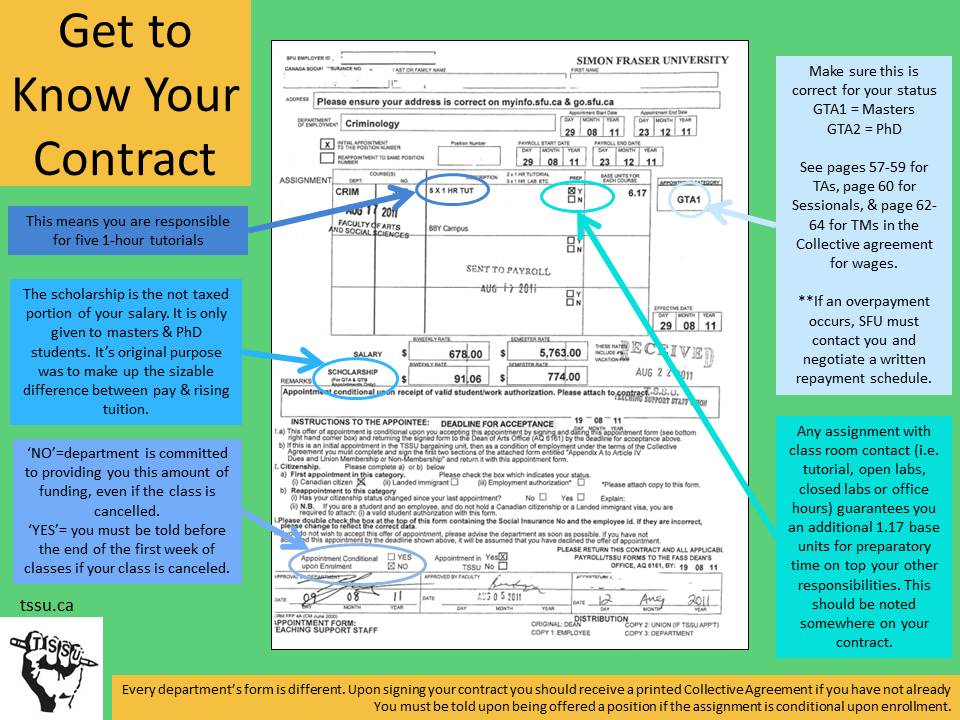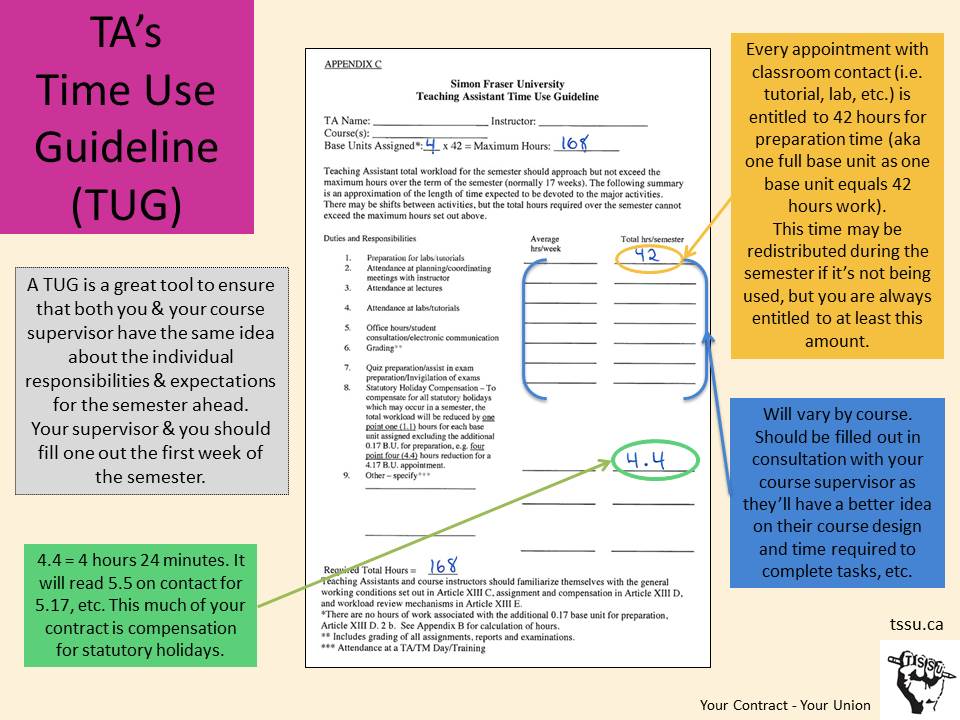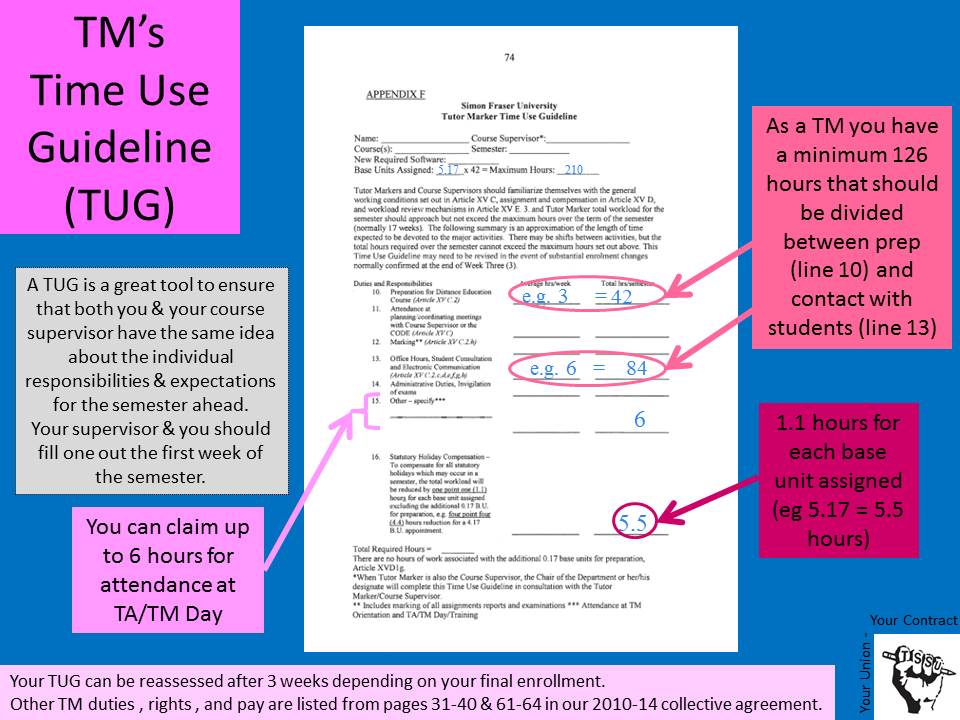This page gives details about workloads and Time Use Guidelines (TUGs) for Teaching Assistants (TAs), Sessional Instructors (SIs), and English Language and Culture (ELC) / Interpretation and Translation Program (ITP) Instructors.
We recommend all members log your hours and have built tools to help you do that
Quick Navigation
Workload and Base Units for TAs
Appointment Forms (also called "Contracts")
For each appointment you should receive a form which outlines your start and end date, rate of pay, and the type of appointment. This "contract" is a very important part of your employment relationship and you should ensure that you receive one from your department.
Base Units:
The work of Teaching Assistants (TAs) is set out in terms of Base Units (BUs). BUs determine both how much money we get and the maximum time we can be requested to expend over the course of the semester. Before starting your duties, you should have received an appointment form that clearly states how many BUs you have for the semester.
Each BU represents a maximum of 42 hours of work, but 1.1 hours are dedicated for statutory holidays, so really it’s a maximum of 40.9 hours. You will not necessarily work that much, but if you are assigned and you go over this, you are entitled to be paid more. There are no hours of work associated with the extra 0.17 on your appointment. So, for example, a 4.17 BU appointment would mean a maximum of 163.6 hours of work.
The collective agreement outlines a system that sets a minimum amount of compensation for base units for certain types of work. In other cases, such as when only marking duties are assigned, the number of base units is determined based on the estimated workload, divided by the maximum 42 hours of work per base unit.
In-person courses with tutorials, labs, workshops, and equivalent contact
In general, all of these assignments receive 1.17 BU for initial preparation. Courses which SFU's senate has designated as "writing intensive" have an additional 1 BU of preparation.
| Type of Contact | Base Unit Formula |
| Tutorial | 1 BU for every 1 hour of tutorial each week |
| Scheduled Lab | 1 BU for every 2 hours of scheduled lab each week |
| Open Lab / Workshop | 1 BU for every 3 hours of open lab each week |
Studios are another common type of student contact, but there is varied practice around that work based on equivalences (see below).
As an example, a TA assigned to teach 4 hour long tutorials each week for a non-writing intensive course would need to be paid a minimum of 5.17 BU for the semester [1.17 BU (preparation) + 4 BU (tutorials)]. Similarly, a TA for a writing intensive course with 2 hour long tutorials and 4 hours of scheduled lab each week would need to be paid a minimum of 6.17 BU for the semester. [2.17 BU (preparing-writing intensive) + 2 BU (tutorials) + 2 BU (lab)].
Former Centre for Online and Distance Education (CODE) Courses
Through the 2023 strike, TSSU forced the Employer to bring back a compensation system based on students for a limited number of courses that used to be run through the Centre for Online and Distance Education (CODE). TAs for these courses now must be paid a minimum of 3.17 BU for the first 20 students then 0.25 BU for every increment of 5 students beyond that.
Faculty of Education
| EDUC | 100W-3 | EDUC | 326-3 | EDUC | 448-4 |
| EDUC | 199-4 | EDUC | 341-3 | EDUC | 464-4 |
| EDUC | 220-3 | EDUC | 351-3 | EDUC | 465-4 |
| EDUC | 222-3 | EDUC | 352W-4 | EDUC | 466-4 |
| EDUC | 230-3 | EDUC | 422-4 | EDUC | 467-4 |
| EDUC | 252-4 | EDUC | 437-4 | EDUC | 471-4 |
| EDUC | 313-3 | EDUC | 441-4 | EDUC | 475-4 |
| EDUC | 315-3 | EDUC | 445-4 | EDUC | 476-4 |
| EDUC | 322-3 | EDUC | 446-4 |
Faculty of Arts and Social Sciences (FASS)
| CRIM | 103-3 | ENGL | 330-4 | HIST | 277-3 |
| CRIM | 104-3 | ENGL | 357-4 | HUM | 102W-3 |
| CRIM | 135-3 | ENGL | 359-4 | HUM | 130-3 |
| CRIM | 210-3 | FREN | 120-3 | INDG | 101-3 |
| CRIM | 220-3 | FREN | 121-3 | INDG | 201W-3 |
| CRIM | 230-3 | GERO | 300-3 | SA | 356W-4 |
| CRIM | 241-3 | GERO | 301-3 | JAPN | 100-3 |
| CRIM | 312-3 | GERO | 408-4 | LBST | 101-3 |
| CRIM | 315-4 | GERO | 413-3 | POL | 344-4 |
| CRIM | 330-3 | GERO | 420-4 | PSYC | 201W-4 |
| CRIM | 355-3 | GRK | 191 | PSYC | 280-3 |
| CRIM | 380-3 | GRK | 192 | PSYC | 362-3 |
| CRIM | 402-3 | GRK | 291 | PSYC | 388-3 |
| ENGL | 203-3 | GRK | 292 | SA | 100W-4 |
| ENGL | 207-3 | GSWS | 101-3 | SA | 101-4 |
| ENGL | 304-4 | GSWS | 102-3 | SA | 150-4 |
| ENGL | 311-4 | GSWS | 309-4 | SA | 201W-4 |
| ENGL | 313-4 | HIST | 339-4 | SA | 250-4 |
| ENGL | 327-4 | HIST | 201-3 | SA | 345-4 |
| SA | 355-4 |
Faculty of Science
| BISC | 113-3 | BPK | 310-3 | STAT | 201-3 |
| BISC | 202-3 | BPK | 325-3 | STAT | 203-3 |
| BPK | 105-3 | BPK | 342-3 | STAT | 270-3 |
| BPK | 110-3 | BPK | 375-3 | STAT | 302-3 |
| BPK | 140-3 | CHEM | 110-3 | ||
| BPK | 141-3 | MATH | 190-4 |
Faculty of Communication Art and Technology
| CA | 104-3 | CMNS | 110-3 | PUB | 355W-4 |
| CA | 140-3 | CMNS | 130W-3 | PUB | 372-4 |
| CA | 142-3 | CMNS | 253W-3 | ||
| CA | 386-3 | CMNS | 453-4 |
Faculty of Environment
| ARCH | 100-3 | ARCH | 301-3 | GEOG | 312-4 |
| ARCH | 131-3 | GEOG | 100-3 | REM | 100-4 |
| ARCH | 201-3 | GEOG | 162-3 | SD | 281-3 |
| ARCH | 226-3 | GEOG | 221-3 | SD | 381-4 |
equivalencies
In certain other cases, the system for base units applies differently, either because of a prior existing practice or because TSSU and the Employer have negotiated and agreed to a separate system because of the particular nature of the work. Some examples of equivalencies are:
| Equivalency | Description | Source |
| Math and Stats Workshops | Only a single preparation amount applies and it is decreased for subsequent appointments | Collective Agreement Appendices J and K |
| Language Training Institute Classses | TAs lead tutorial sections, but these sections are paid as if they were labs for enrollment up to 19 students per section. An an increment of .25 base units is paid for each additional 5 students. | Negotiated settlement |
| French Workshop (WW) | TAs are assigned up to 3 or 6 hours a week for 10 weeks in a workshop and are paid 1.24 BU and 2.01 BU respectively (including 0.17 BU for which no work is attached) | Equivalency established per Article 13.D in 2018 |
Graphical Appointment Form Explanation
Time Use Guidelines (TUGs)
A Time Use Guideline (TUG) is a form that outlines the expected breakdown of hours for a TA appointment. The amount of hours on the TUG must not exceed the amount of hours available for the appointment.
TA TUG Graphical Explanation
CODE TUG Graphical Explanation
Workload Reviews
Every TA must receive a workload review during the course of their appointment as a way of checking in. It is the responsibility of the Employer to ensure that workload reviews are completed. If you have not received a workload review, please contact us.
Work after the semester
A TA contract has a specified start and end date. After the end of the contract, any work a TA is asked to perform must be compensated at an hourly rate. Contracts typically end after the last day of classes, but this can vary depending on the department and the semester. If you have been asked to work after the end of your contract, please contact us.
Contact Hours for Sessional Instructors
Since Sessional Instructors do not have hours of work in their contracts, pay is calculated based on the amount of time spent in lectures, tutorials, and seminars (known as "contact hours"). See Article 14.D.2 of our Collective Agreement for more information.
If a course is marked "conditional upon enrollment" it may be cancelled after being assigned to a Sessional Instructor. If this happens, the Sessional is eligible for .75 contact hours worth of pay, or 1 contact hour if the course is cancelled in the first week of classes. See Article XVII for more information.
Work after the semester
Sessional Instructors who work outside the term of their appointment are eligible for additional pay as per article 14.D.3 (Sessional instructors / Compensation). The rate of pay for such work is at the GTA 2 rate, calculated hourly.
Contact Hours for ELC/ITP Instructors
The Collective Agreement outlines two types of hours for ELC/ITP Instructors: Contact Hours, or “instructional hours scheduled by the University,” and non-Contact hours, or “[w]ork hours not scheduled by the University, that constitute the balance of the standard full-time work week” (L Article V.A.1&2, p.105).
The number of hours scheduled by the University determines the contact hour workload, and another unscheduled 1 hour and 20 minutes per contact hour makes up the balance of the standard work week. For the full-time maximum of fifteen (15) hours, this results in a maximum total of thirty-five (35) hours per week (it's pro-rated for those scheduled for fewer than the maximum).
The Collective Agreement defines overtime as “time worked in excess of seventeen (17) contact hours in any given week,” “paid at one and a half (1.5) times the instructor’s regular contact hour rate for hours worked” (L ArticleV.7.b&c, p. 106).
Special Assignments
Other “[s]pecial assignments,” “shall be part of the scheduled workload in lieu of contact hours” (L Article V.8, p.106).



